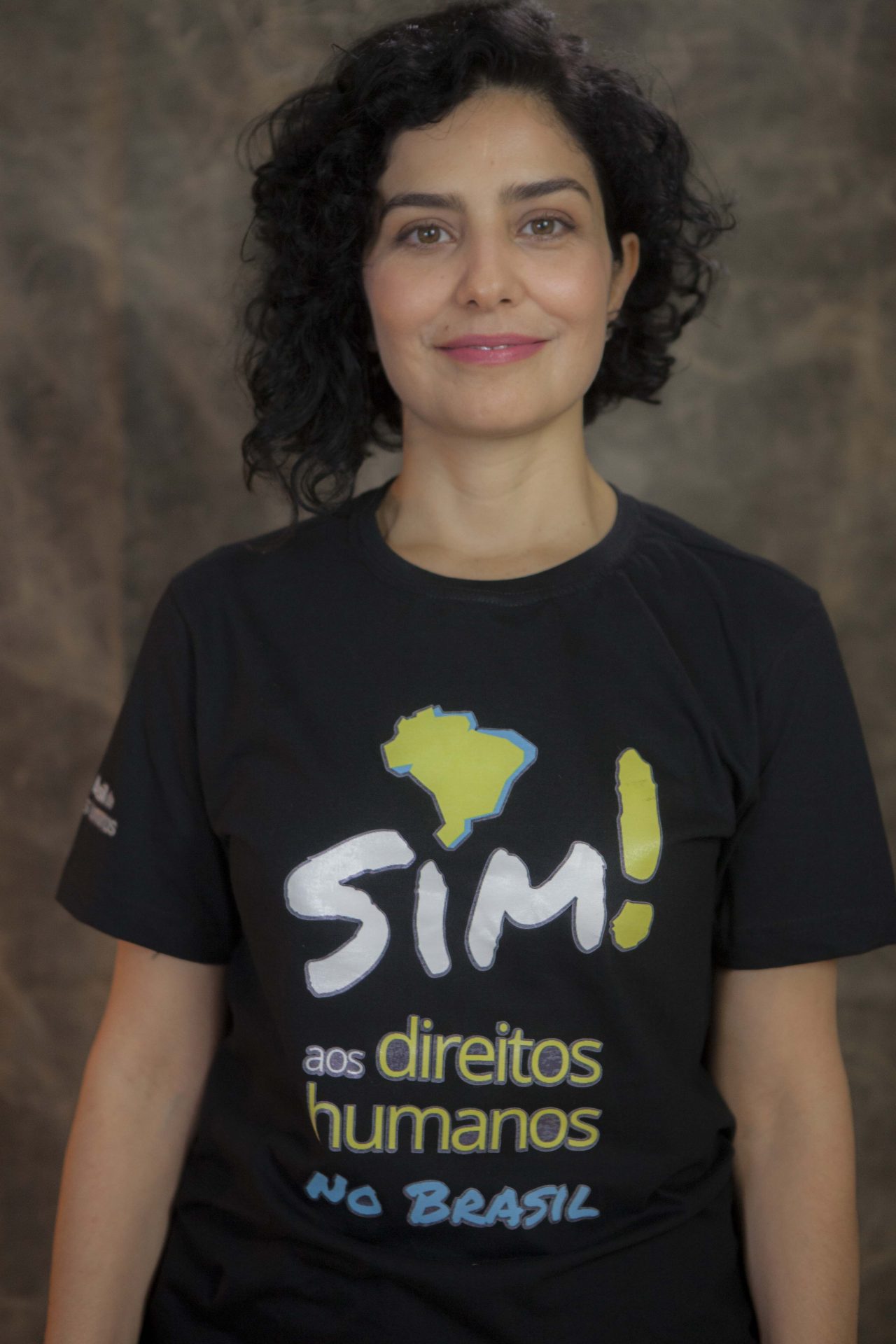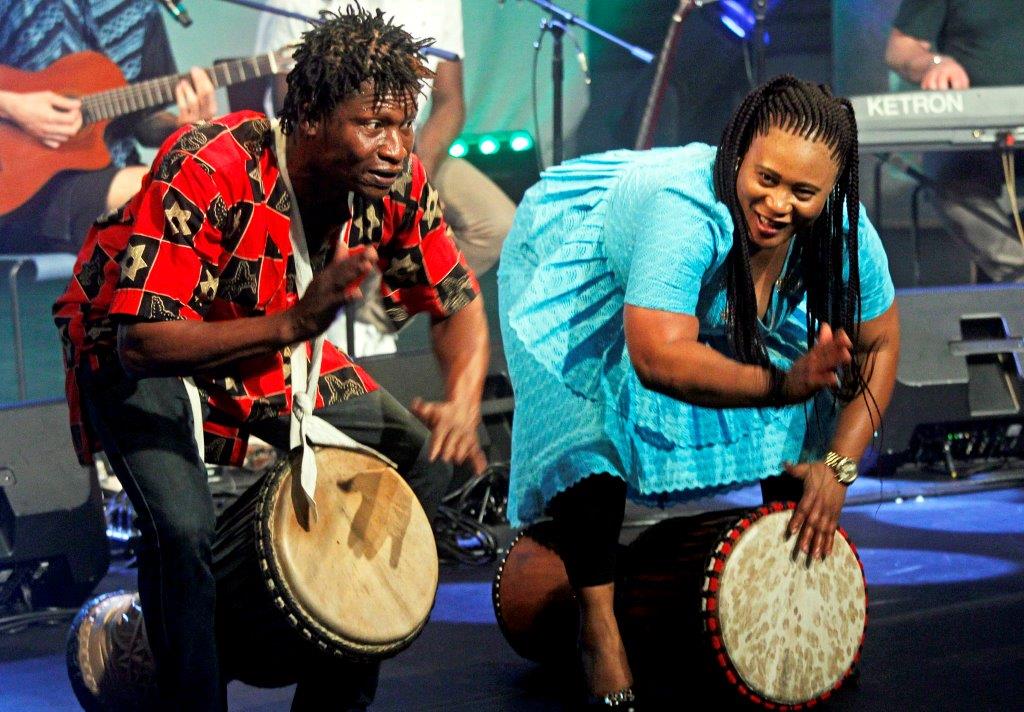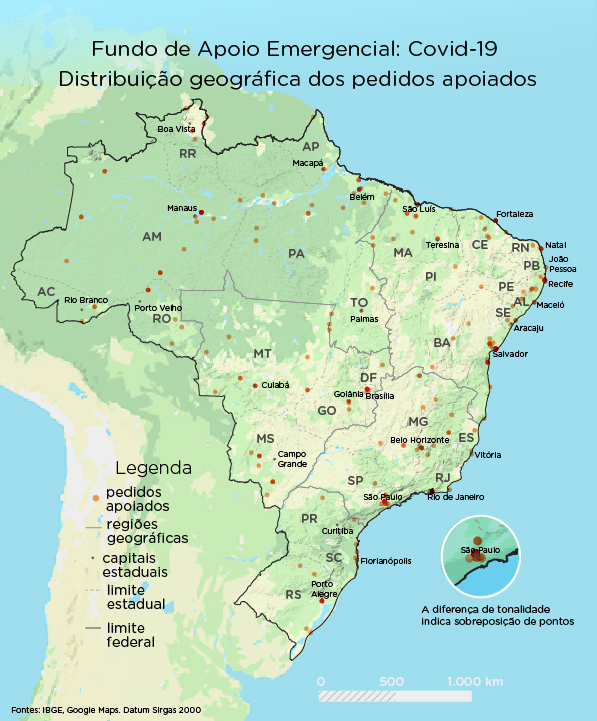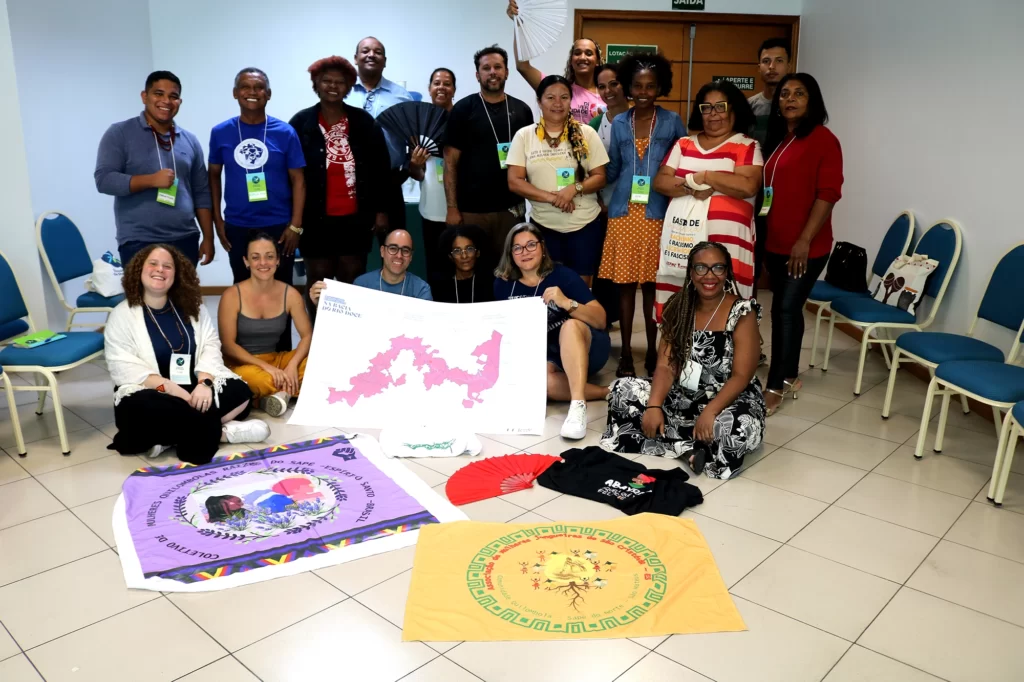
Organizations from the Rio Doce Basin during training promoted by the Brazil Fund in São Paulo. Photo: Mônica Nóbrega/ Brazil Fund Collection
Access to water, territory autonomy, preservation of culture and ways of life, subsistence and respect are currently some of the defining challenges in the lives of the populations of the Rio Doce Basin. These were the prominent themes in a workshop promoted by the Brazil Fund, that gathered leaders from 17 organizations that have been selected in the Promotion and Defense of Human Rights in the Rio Doce Basin call for proposal.
The projects selected in the call for proposal are from collectives of Black women, youths, LGBTQIA+ populations, rural communities, family farmers, Indigenous peoples, quilombolas (traditional communities of descendants of enslaved people in Brazil), small-scale fishers, among others. All are in the Rio Doce Basin, area encompassing the States of Minas Gerais and Espírito Santo. The challenges for the defense of rights in the region are worsened by environmental disasters that are among the biggest and most lethal in Brazilian history.
The list of selected groups was announced by the Brazil Fund in October 2024, and the groups started the execution of their projects in December.
To promote gatherings for collective acknowledgement, peer learning and coordination is a fundamental part of the Brazil Fund’s support methodology to institutionally strengthen the human rights organizations. Among the groups present, nine achieved in this call for proposal their first grant.
“This support and the flexibility of the Brazil Fund are very important for the strengthening of our association. For instance, our community doesn’t have service providers with invoice, and to go after providers in neighboring towns would include a high transportation fee”, said Ademilton Gonçalves, from the Residents and Friends Association of Barro Branco, Córrego da Laje and Adjacencies (AMBACLA), from the municipality of Barra Longa (MG).
“This trust-based relationship is one of the pillars of our support”, says Thainá Mamede, Brazil Fund’s program officer, responsible for the Promotion and Defense of Human Rights in the Rio Doce Basin call for proposal. “We engage closely with each project and offer respectful and tailored support, which helps organizations to develop their institutional capacities, achieve their goals, expand the positive impact of their efforts, and ensure the transparency of their work in a way that makes sense in each territory.”
Luciana dos Anjos, from the Association of Warrior Women of Aldeia Irajá, in Aracruz (ES), remembered the importance of the in-person meetings, both between those supported by the Brazil Fund as well as in the territories. “For us, in our villages, not everything can be fixed by technology”, she said. “We lack internet access in our territory, and that weakens our women’s movement”, she added.
Challenges and paths
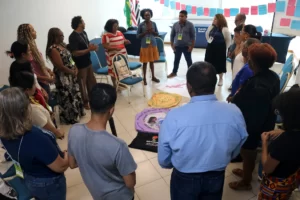
During training, the collectives presented and spoke of their challenges, struggles and common strategies. Photo: Mônica Nóbrega/ Brazil Fund Collection
According to the present leaders in the gathering, the impact of climate change has been felt acutely in the Rio Doce Basin.
“Oftentimes we lose produce because the weather is changing. I’ve done four attempts with beans, and lost the beans for lack of water”, told Cida Calazans, from the Association of Settled Families in the Sacramento Chico Mendes II Farm Settlement Project, in the municipality of Pingo D’Água (MG).
Water is a critical point to all segments of the Basin, be it agriculture, fishing, human and animal consumption, populations’ leisure and sociability. Manoel dos Santos, o Nego da Pesca, from the Association of Fishers of Jacaraípe and national leader in small-scale fishing, reinforced that each fisher guarantees work for more four or five people. “The one who does maintenance in the engine, the one who does maintenance in the boat, the one who processes the fish, the one who sells it in the market”, he said. This activity has been suffering for years the consequences of mining refuse spills in the Rio Doce, in its tributaries and in the coast of Espírito Santo.
“Those who can, buy gallon water. Those who can’t, drink from the Rio Doce. As much as we drink that water, we have an eternal mistrust”, said Nico Dias, from the SHIVA Collective (Information Life and Art Humanitarian Service), from Colatina (ES).
The participants in the gathering have also named solutions for the problems that affect their territories, and ways toward the promotion of rights. For Nego da Pesca, an office exclusively focused on this activity in the municipality of Serra (ES) could address the small-scale fishers’ issues more effectively. “To ensure the respect and valorization of our category”, he said.
Doralice de Oliveira, from the Association of the Camões Agrarian Family School, in Sem-Peixe (MG), points to agroecology as the way toward rescuing autonomy in her municipality, currently dominated by agrobusiness for the production of milk. “Agroecology doesn’t just encompass the planting, it also includes the other causes, the fight against slave labor, environmental education, political training”, she highlighted.
Júlia Beatriz of the Diversity Collective, from the municipality of Governador Valadares (MG), recalled the importance of collective action. “It’s really fundamental to be together in order to fight for the end of discriminations in our municipality”, commented Beatriz.
Specific call for proposal for the Rio Doce
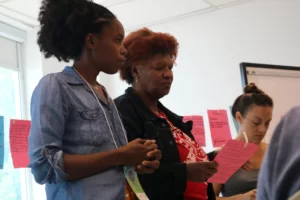
Mônica Nóbrega/ Brazil Fund Collection
The Promotion and Defense of Human Rights in the Rio Doce Basin call for proposal is the first by the Brazil Fund specific for this territory. It’s a part of an acting line with a duration of at least five years.
“We intend on launching other grants for the defense of human rights in the Rio Doce Basin. Our idea, with this first, more general, call for proposal, is that we could embrace many themes and priorities from the readings and experiences that we already have of the region”, explained Ana Valéria Araújo, the Brazil Fund’s executive director.
“Our aim is to try to strengthen the civil society in the many themes and biases important to the region, beyond the process of reparations for those affected by the refuse barrage ruptures”, said Ana Valéria.
The gathering for the Promotion and Defense of Human Rights in the Rio Doce Basin call for proposal also counted with the presences of Eliane Inácio, of the Association of Black Women from Colatina and Zacimba Gaba Region (ES); Luiza Faresin, of the Terra do Bem Collective, from Conceição da Barra (ES); Maycon Krenak, of the Burum Ererré Indigenous Association, from Resplendor (MG); Marília Vieira, of the Itueta Occupation (MG); Maria Inês de Souza, of the Association of Quilombos and Afro-descendant Groups of São Domingos do Prata, the Aquistoprata; Olindina Cirilo, of the Collective of Quilombola Women, from Conceição da Barra (ES); Josiléia Nascimento, of the Association of Jongueira (traditional afro-Brazilian dance) Women, from São Mateus (ES); Pedro Henrique, of the Association for Agrarian and Fishing Cooperation, Production, Processing and Consuming of the Liberdade Settlement (ACOAL), from Periquito (MG); Érika Benigna, of the Abayomi Collective, from Governador Valadares (MG); and Marlene Imaculada, of the Association of Family Farmers from Córrego do Celeste and the Vale do Aço Region, from Marliéria (MG).






















